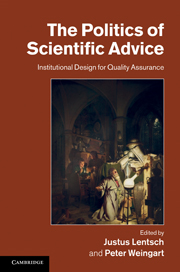Book contents
- Frontmatter
- Contents
- List of figures
- List of tables
- Acknowledgements
- Biographical notes
- Part I Methodological issues: quality control and assurance in scientific policy advice
- Part II Collegial science advisory bodies
- Part III Collegial science policy advisory bodies
- Part IV Research-based advisory organisations
- 10 The industrial organisation of economic policy preparation in the Netherlands
- 11 Quality control for the leading institutes of economic research in Germany: promoting quality within and competition between the institutes
- 12 Quality control and the link between science and regulation from a national and EU administrator's perspective
- 13 Science into policy: The European Environment Agency
- 14 Reflective approaches to uncertainty assessment and communication
- 15 Looking through the telescope – quality assurance in scientific advice to politics
- 16 Scientific policy advice and foreign policymaking – Stiftung Wissenschaft und Politik (SWP), the German Institute for International and Security Affairs
- Part V Academies of science
- Index
- References
14 - Reflective approaches to uncertainty assessment and communication
Published online by Cambridge University Press: 25 October 2011
- Frontmatter
- Contents
- List of figures
- List of tables
- Acknowledgements
- Biographical notes
- Part I Methodological issues: quality control and assurance in scientific policy advice
- Part II Collegial science advisory bodies
- Part III Collegial science policy advisory bodies
- Part IV Research-based advisory organisations
- 10 The industrial organisation of economic policy preparation in the Netherlands
- 11 Quality control for the leading institutes of economic research in Germany: promoting quality within and competition between the institutes
- 12 Quality control and the link between science and regulation from a national and EU administrator's perspective
- 13 Science into policy: The European Environment Agency
- 14 Reflective approaches to uncertainty assessment and communication
- 15 Looking through the telescope – quality assurance in scientific advice to politics
- 16 Scientific policy advice and foreign policymaking – Stiftung Wissenschaft und Politik (SWP), the German Institute for International and Security Affairs
- Part V Academies of science
- Index
- References
Summary
Introduction
Policy decisions in many areas involving science, including the environment and public health, are both complex and contested. Typically there are no facts that entail a unique correct policy. Furthermore, political decisions on these problems will need to be made before conclusive scientific evidence is available. Decision stakes are high: The impacts of wrong decisions based on the available limited knowledge can be huge. Actors disagree on the values that should guide the decision-making. The available knowledge bases are typically characterised by imperfect understanding (and imperfect reduction into models) of the complex systems involved. Models, scenarios and assumptions dominate assessment of these problems, and many (hidden) value loadings reside in problem frames, indicators chosen and assumptions made.
The evidence that is embodied in scientific policy advice under such post-normal (Funtowicz and Ravetz 1993) conditions requires quality assessment. Advice should be relevant to the policy issue, scientifically tenable and robust under societal scrutiny. Governmental and intergovernmental agencies that inform policy and the public about complex risks increasingly recognise that uncertainty and disagreement can no longer be suppressed or denied, but need to be dealt with in a transparent and effective manner. In response to emerging needs, several institutions that interface science and policy have adopted knowledge quality assessment approaches, where knowledge refers to any information that is accepted into a debate (UK Strategy Unit 2002; EPA 2003; MNP/UU 2003; IPCC 2005).
- Type
- Chapter
- Information
- The Politics of Scientific AdviceInstitutional Design for Quality Assurance, pp. 259 - 269Publisher: Cambridge University PressPrint publication year: 2011
References
- 3
- Cited by



